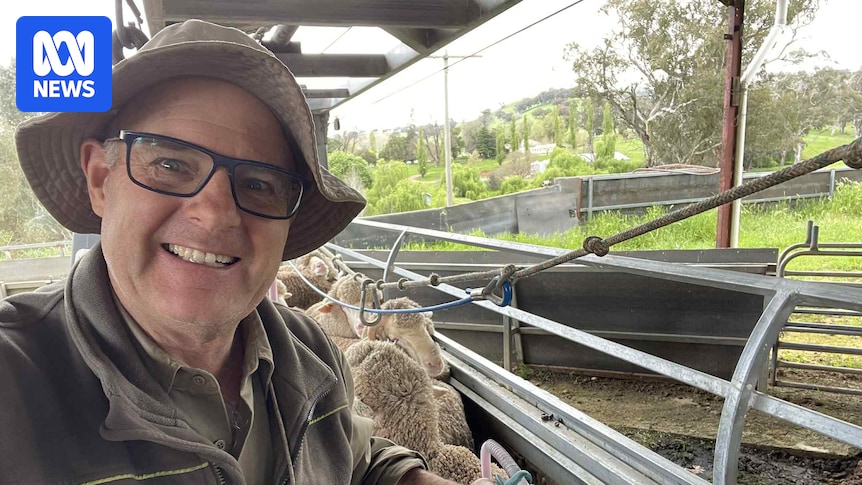David Ham could be considered one of the lucky spinal cord injury (SCI) survivors, if you consider only his physical injuries.
The 64-year-old from Wagga Wagga injured one of the vertebrae in his neck when he fell off his bike in 2017.
“The spinal cord was intact, it wasn’t cut, it was just crushed and bruised,” he said.
David Ham fell off his bike in 2017 and suffered a C3 incomplete spinal cord injury. (Supplied: David Ham)
Recovery was initially swift. His injury was incomplete quadriplegia and he was able to walk out of the hospital on crutches.
But his improvement began to slow.
“It’s just static, and it’s remained so,” he said.
Mr Ham needs a walking stick when he is in public areas due to a drop foot, a symptom caused by weakness or paralysis of the muscles.
“I trip on my right toe all the time and if I’ve got a stick it will save me from falling,” he said.
If you or anyone you know needs help:Suicide Call Back Service on 1300 659 467Lifeline on 13 11 14Aboriginal & Torres Strait Islander crisis support line 13YARN on 13 92 76Kids Helpline on 1800 551 800Beyond Blue on 1300 224 636Headspace on 1800 650 890ReachOut at au.reachout.comMensLine Australia on 1300 789 978QLife 1800 184 527
Mr Ham said being a spinal cord injury survivor could be an isolating experience, especially in regional and rural areas where there were limited specialist services.
“It’s all pretty daunting.
“Particularly in the early days, when you’re first out of hospital.”
Mr Ham said mental health challenges for SCI survivors were real and he had accessed online mental health programs run by Spinal Cord Injury Australia.
“We talk about mental health and what we can do to make ourselves strong and resilient,” he said.
Bringing people together
David Ham says it can be difficult to meet people with a spinal cord injury in regional and rural areas. (ABC News: Rachel Holdsworth)
Mr Ham has also started a community by hosting regular sessions at his local RSL with other SCI survivors.
“I really wanted to talk to people who had spinal cord injuries and learn their experiences,” he said.
Rebecca Gill attended the first session.
Rebecca Gill says it can be isolating living with a spinal cord injury. (ABC News: Rachel Holdsworth)
“It can be quite isolating in the community when you don’t know somebody else that has a similar disability,” she said.
Ms Gill has lived with her spinal cord injury, transverse myelitis, for nearly four years.
“[It] … causes your immune system to attack itself … and it caused inflammation in my spinal cord and crushed my spinal cord,” she said.
“Originally, I was fairly confident that I would return to my normal self but … that hasn’t happened,” she said.
Ms Gill said finding appropriate services and care in regional communities could be difficult and not knowing who to talk to could make the situation worse.
“Wagga is quite isolated, I guess, in terms of resources for people with spinal cord injuries,” she said.
David Ham says the sessions are a social event but also a way to advocate for people with a disability in the bush. (ABC News: Rachel Holdsworth)
In addition to the meetings, Mr Ham also became a board member of Spinal Cord Injury Australia and advocates for other injury survivors.
“It’s about making it your best life and improving things,” he said.
“The obvious one is accessibility; it’s an ongoing problem and it probably always will be.”
Biking, sailing and volunteering
Rehabilitation physician Rachael McQueen said a SCI damaged “the super-highway” connecting the muscles to the brain.
She said injuries like Mr Ham’s were usually considered “high level and potentially life-threatening”.
Dr McQueen said some of Mr Ham’s neuropathways were still intact, which is why Mr Ham still had the ability to walk.
David Ham has returned to sailing with the help of his community, family and friends. (Supplied: David Ham)
“[He] would still be considered as incomplete quadriplegia … it just affects your muscles, and sensations, bladder and bowl functions in slightly different ways,” Dr McQueen said.
She said Mr Ham continued to undergo an intensive exercise program, which enabled him to maintain his muscles and strength.
Mr Ham is now able to ride his bike again, sail regularly and volunteer with his local Rural Fire Service brigade.

